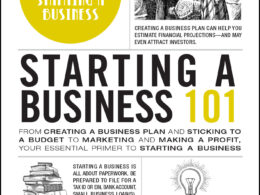For many, August is a time to kick back and relax before summer ends and schedules ramp up for the fall. But for entrepreneurs, unplugging from business and truly relaxing can be a challenge, because they worry that the business can’t run without them.

Serial entrepreneur and author Mike Michalowicz knows this feeling all too well, and his latest book, “Clockwork,” shows business owners how to better create systems so their business can run efficiently without them. Michalowicz is also the author of “Profit First” and “The Toilet Paper Entrepreneur,” among other titles.
We caught up with Michalowicz to find out why owners need time away, how to fix bottlenecks in the business and more. The following conversation has been edited for clarity and brevity.
StartupNation: Who do you think needs this book the most? What’s holding them back from allowing their business to run on its own?
Mike Michalowicz: I think it’s people who have an ego challenge. And the reason I say that is because I was the guy with the ego challenge. I thought that my business couldn’t survive without me. I thought there was no one as capable as me. And I realized that my ego and this codependency was preventing me from the next level of progress in my business.
I wrote the book for any entrepreneur who feels that their business will die without them. Solopreneurs feel that there’s no one as capable as them, and they get frustrated when they hire someone and they say, “Gosh, they can’t perform on my level.”
All of those emotions are actually rooted in ego, and the way to escape from it is hopefully what I document in the book.
Related: Want Your Business to Run Itself? Start by Building a Balanced Team
StartupNation: Your book mentions that solopreneurs can use the Clockwork framework, but it seems like that may be trickier for someone without employees. Would you tell us a bit more about that?
Mike Michalowicz: I did 75 case studies for the book specifically, but also taught with and interviewed with hundreds of others. What I found is that the sooner they start focusing on how they can make the business run itself by itself, the quicker it is a reality. A solopreneur, where there aren’t any employees, can still do this through the use of software automation and hiring virtual assistants or part-time assistants.
More established companies are routinized in their processes, but it actually can get a little more difficult to rule themselves out because there’s this tradition that’s been established. Their challenge is breaking the culture of dependency on the owner of the business.
StartupNation: Early on, your book mentions finding the bottlenecks in your business. So how do you find the bottlenecks, and then how do you fix them?
Mike Michalowicz: The problem with the bottleneck is that a business only can run as quickly or as efficiently as its slowest part, kind of like a chain. Identify where the weakest link is, strengthen that one link in a chain, and the entire strength of the chain elevates. If we fix other links that aren’t the weakest, it will still break at the weakest link, so we actually haven’t fixed it.
In a business, the weakest link is what I call a time pile, where things have to wait. If I’m writing a book, the research phase might be a time pile. It’s the interviews that take so long, coordinating and finding them.
If we relive that, everything can speed up. For research, for example, now we have a research arm. There are multiple people beyond just me now conducting research. For me to produce a book, it happens much faster now because that time pile or that bottleneck has been removed.
This is true for every business. Look for your time piles. To fix it, concentrate energy on how to make that run faster by fixing that one weakest link.
StartupNation: Do you identify bottlenecks based on time tracking? Or are there other ways that business owners can identify that in their own situation?
Mike Michalowicz: Time tracking is one. It’s really points to frustration. What are your employees get frustrated about? When do they point fingers? When they say, “I can’t get this done because I’m waiting for …” and they point to someone else, that could be an indication of a bottleneck.
Sometimes the bottleneck isn’t that it just takes long to do. It’s forgotten. They go, “Oh, I thought I gave it to so-and-so, but I didn’t give it to so-and-so.” And so it just sat on a desk or it sat in an email. Just because something waits a long time doesn’t mean it’s going to require tremendous effort to fix it.
Sign Up: Receive the StartupNation newsletter!
StartupNation: Is there anything else that you’d like readers to know about you or about your latest book?
Mike Michalowicz: I do make one outrageous request of readers, and it’s kind of shock therapy when it comes to designing your business to run itself. It’s declaring a four-week vacation. Total disconnect is such an extraordinary step that they are forced to look at their business in an entirely new way. Most entrepreneurs say, “Yeah, I’ll take a week’s vacation from my business, and it’ll continue to run.” And then they play a simple game of crunch in as much work before they leave, and then catch up the staff again when they return.
But when they go away for four weeks, every element of the business has to continue to run. That’s an extraordinary period of time. So, that’s all the action I’d love readers to contemplate: Break away from your business for four weeks. Make it a planned vacation for a year or two from now.






